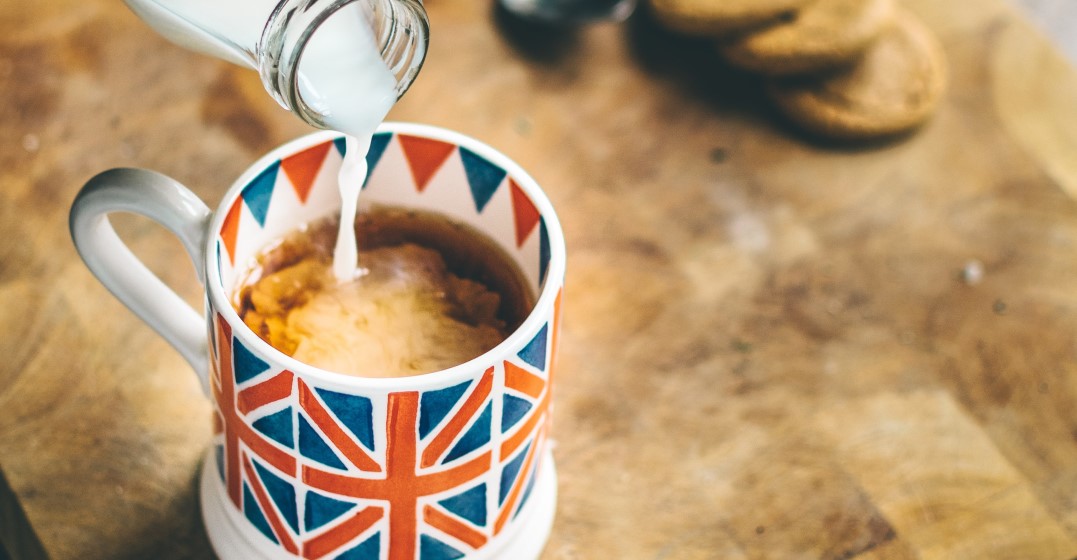by Laura Jones
Updated on January 9, 2024
Do you know what to do when someone tells you to budge up? And how would you feel if you were skint? When you learn English and travel to the British Isles, you might feel a little confused when it comes to everyday interactions with locals. The British have a lot of unique slang and at times it might slip into conversations. So, not to let it ambush you, let’s crack on and learn some.
If you learn only one word before traveling to the UK, let it be cuppa. Meaning “a cup of tea”, you’ll barely get through the door of any British home before you hear, “Fancy a cuppa?” Just make sure you specify if you want it with milk or not – I know the great British drink makes some foreigners a little queasy.
If you don’t fancy a cuppa, maybe you’d prefer a pint? Walking into a pub and saying, “I’ll have a pint please,” always means a pint of beer, don’t expect to get a pint of water or lemonade handed to you.
This means “move over” or “make space for me to sit down”. Say this to someone you know well, not a stranger on the Tube.
Of all the things you want to be, skint is definitely not one of them. This British slang term means you have no money.
Get on with it, keep going or start doing something. While working you might hear, “Let’s crack on, the pub closes in half an hour.”
One British Pound. “Mate, lend me a quid for some chips, I’m skint.” (A quid actually won’t get you very far in the UK. You’d need at least a fiver (£5), or more likely a tenner (£10) to get a decent amount of food.)
Very happy. “I was really chuffed when I found a tenner in my pocket.”
The opposite of chuffed, so very disappointed or unhappy. “I was gutted when I heard Prince Harry had got married.”
Really tired. “I’m knackered, I was binge-watching Netflix all night.”
This has replaced ‘LOL’ – so it means you found something really, really funny. “Donald Trump’s hair.” “Dead.”
Originally used to mean retching – and it still means that – gagging is also used for when you’re really thirsty. “I’m gagging for a cuppa – tough day.”
“I stopped for a cheeky curry on the way home.” I know it wasn’t healthy to eat that, that’s why I’m telling you it was cheeky. Also used with drinks: “I had a cheeky pint of cider to celebrate!” This can also mean you had more than one. “Let’s go for a cheeky wine after work”, can also suggest, let’s go to the pub until closing time.
Cheeky can also be used as low-level rude. “Ooh, he’s a bit cheeky” meaning he’s quite attractive.
You probably know this one in the context of clinking glasses in a pub. But Brits also use cheers to say “thank you” or even to say “goodbye”. Not to be said in an American accent – you guys across the pond really can’t pull it off. It’s like a Brit trying to say howdy y’all.
It’s no secret that a lot of Brits like a few cheeky pints every now and again. So it follows that we have quite a few adjectives to describe a state of drunkenness.
Not much to do with a supermarket trolley, I don’t think. Other than that, you might well see some tipsy British students pushing their mates home in a trolley they’ve “borrowed” from Tesco.
As in so drunk your legs aren’t working the way you want them to.
Very drunk.
As above. And there are so many more.
Aka, smashing two words together to make a new one. An example that almost everyone the world over knows is brunch, a combination of “breakfast” and “lunch”.
Put gigantic and enormous in a room together and nine months later they will have a ginormous baby.
This one is a little rude – just a little, honestly; it is a portmanteau of “crap” and “spectacular”. It is usually used to talk about entertainment that is so bad it’s good. “Mamma Mia 2 is craptacular – it’s my guilty pleasure watching when I’m on a plane.”
Maybe one not to mention at the moment in the UK as it’s a sore subject for both sides. But Brexit is an amalgamation of “Britain” and “exit”. “So, who voted for Brexit?”… cue awkward silence.
What makes learning a language such a unique experience is getting out of the context of textbooks and immersing, instead, into the real language. The one people use on a daily basis might sound a little weird or unfamiliar at first. Start getting some practice on these 20 words from the British slang and get ready for that language win. You going to be chuffed!
